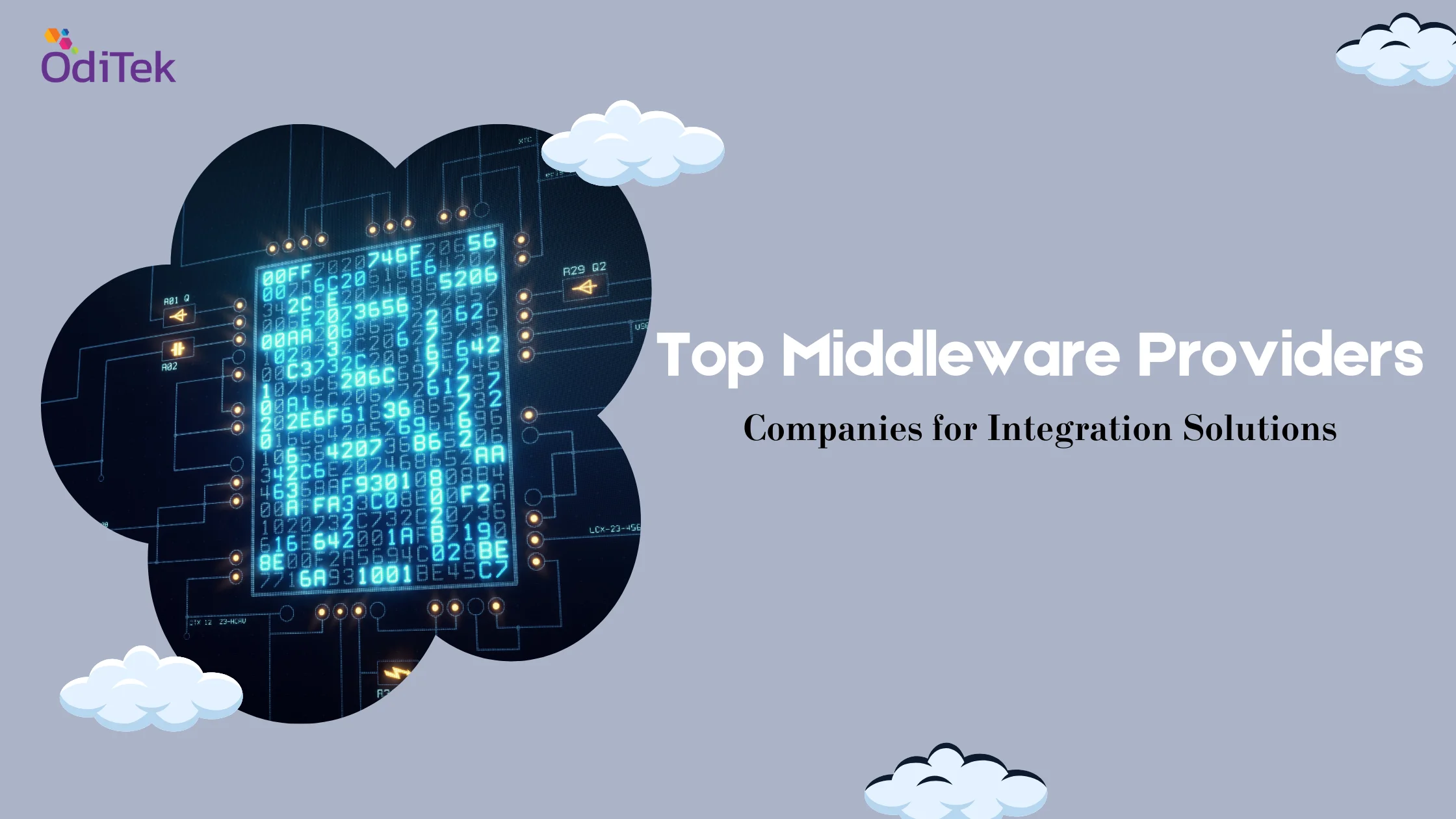In the fast-paced world of digital transformation, middleware software plays a crucial role in ensuring seamless communication between applications, systems, and databases. Whether it’s about integrating legacy systems or enhancing modern cloud-based solutions, middleware serves as the backbone of any robust IT infrastructure. In this blog, we will explore the best middleware software companies, highlighting their offerings and why they are considered top middleware providers.
What is Middleware?
Middleware is software that acts as a bridge between different applications or platforms, enabling them to communicate and work together efficiently. It facilitates data exchange, application integration, and workflow automation, making it an essential component for enterprises looking to optimize operations and drive innovation.
Why Do Businesses Need Middleware?
Businesses require middleware for:
1. System Integration
Middleware connects disparate systems, enabling seamless data sharing and communication. It bridges the gaps between legacy systems, modern cloud platforms, and third-party applications. By facilitating interoperability, middleware ensures that all systems within an organization work cohesively, reducing manual efforts and improving overall efficiency.
2. Enhanced Scalability
Middleware supports the growth of IT infrastructure by adapting to increasing data volumes, user loads, and evolving business requirements. Scalable middleware solutions allow organizations to expand their operations without needing frequent system overhauls, ensuring that the infrastructure remains robust and future-proof.
3. Real-Time Communication
Middleware ensures smooth and real-time data flow across platforms, critical for decision-making and operational efficiency. By enabling instantaneous data synchronization and reducing latency, it enhances collaboration between different departments and systems, leading to faster and more informed business actions.
4. Reduced Complexity
Middleware simplifies application development and deployment by providing a unified framework for integration and management. It abstracts the complexities of connecting various systems, allowing developers to focus on core functionalities rather than integration challenges. This simplification accelerates time-to-market for new applications and services.
Top Middleware Providers and Software Companies
1. IBM
IBM stands as a leader in the middleware space with its flagship product, IBM WebSphere. Known for its reliability and scalability, WebSphere supports enterprise application integration, API management, and business process automation.
• Key Features: Robust security, cloud-native capabilities, and real-time analytics.
• Best For: Large enterprises requiring high-performance middleware.
• Additional Insights: IBM also offers advanced AI-driven capabilities through its Watson services, making it a top choice for businesses seeking innovative solutions.
2. Oracle
Oracle’s middleware solutions, including Oracle Fusion Middleware, are designed to support enterprise-grade integration and application development. With a strong focus on cloud compatibility, Oracle ensures seamless operations across hybrid environments.
• Key Features: Comprehensive integration tools, advanced analytics, and AI-driven capabilities.
• Best For: Organizations leveraging Oracle’s ecosystem.
• Additional Insights: Oracle’s extensive support for database management and ERP systems makes it a preferred choice for enterprises with complex IT infrastructures.
3. Microsoft
Microsoft Azure offers a range of middleware services through its cloud platform. Azure Integration Services supports API management, event grid, and logic apps to create efficient workflows.
• Key Features: Cloud-native integrations, scalability, and extensive documentation.
• Best For: Businesses adopting Microsoft’s cloud services.
• Additional Insights: Azure’s seamless integration with Office 365 and Dynamics 365 enhances productivity and collaboration.
4. Red Hat
A subsidiary of IBM, Red Hat is renowned for its open-source middleware solutions like Red Hat JBoss Middleware. It’s highly customizable and suitable for a variety of use cases.
• Key Features: Open-source flexibility, enterprise-grade security, and support for microservices.
• Best For: Companies seeking open-source solutions.
• Additional Insights: Red Hat’s community-driven approach ensures constant innovation and cost-effectiveness.
5. TIBCO Software
TIBCO specializes in data integration, API management, and analytics. Its middleware solutions are known for enabling real-time decision-making and operational efficiency.
• Key Features: Real-time data processing, robust integration tools, and AI capabilities.
• Best For: Data-driven enterprises.
• Additional Insights: TIBCO’s emphasis on predictive analytics makes it a powerful tool for enterprises aiming to stay ahead in competitive markets.
6. Boomi
Boomi, another middleware provider and a Dell Technologies company, provides a cloud-native middleware platform that simplifies integration across applications, data sources, and devices.
• Key Features: Low-code interface, extensive connector library, and real-time data sync.
• Best For: Fast-growing businesses and startups.
• Additional Insights: Boomi’s AtomSphere platform accelerates time-to-market and reduces operational costs.
7. Celigo
Celigo focuses on intelligent integration through its iPaaS (Integration Platform as a Service) solutions. It’s widely recognized for its user-friendly approach and pre-built templates.
• Key Features: Intuitive design, scalability, and fast deployment.
• Best For: SMEs looking for affordable middleware solutions.
• Additional Insights: Celigo’s tailored solutions for e-commerce and ERP integrations make it a go-to option for niche industries.
8. Jitterbit
Jitterbit offers middleware solutions that combine integration, API creation, and automation. Its Harmony platform is well-suited for modern business needs.
• Key Features: Rapid integration, robust API management, and workflow automation.
• Best For: Mid-sized businesses and enterprises.
• Additional Insights: Jitterbit’s AI-driven integration capabilities streamline complex workflows and improve decision-making.
Choosing the Best Middleware Provider
When selecting a middleware provider, consider the following factors:
1. Compatibility
Ensure the middleware supports your existing systems. A good middleware solution should integrate seamlessly with your legacy applications, modern cloud platforms, and other IT components. Compatibility reduces the need for extensive customizations and ensures faster deployment.
2. Scalability
Choose a provider that grows with your business. Middleware should support increasing data volumes, user loads, and evolving business requirements without compromising performance. Scalable solutions help you avoid frequent upgrades and provide long-term value.
3. Ease of Use
Opt for user-friendly platforms to reduce learning curves. Middleware should offer intuitive interfaces, pre-built templates, and comprehensive documentation to simplify configuration and management. This ensures that both technical and non-technical teams can maximize its potential.
4. Support
Look for companies offering strong customer and technical support. Reliable support ensures prompt resolution of issues, minimizing downtime. Evaluate providers based on their availability, expertise, and the range of support options like live chat, email, or dedicated account managers.
Conclusion
The best middleware provider software companies offer solutions that cater to diverse business needs, ensuring seamless integration, scalability, and enhanced operational efficiency. Whether you’re a large enterprise or a growing startup, there’s a middleware solution tailored for you. Explore the top middleware providers mentioned above and take a step closer to achieving your digital transformation goals.
Are you ready to elevate your business with the right middleware? Contact Oditek Solutions today to learn how our expertise in middleware solutions can help you integrate, innovate, and succeed.







